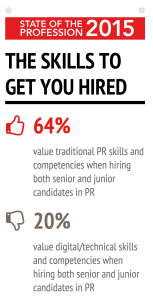 CIPR has put it in black and white (and red): senior PR pros in the U.K. really don’t care about using social media. The trouble is, smart strategic PR today demands it. So what will they do about it?
CIPR has put it in black and white (and red): senior PR pros in the U.K. really don’t care about using social media. The trouble is, smart strategic PR today demands it. So what will they do about it?
PR pros using social media… not
This isn’t just me ranting (though I’ve done so before). This time it’s the U.K.’s Chartered Institute of Public Relations with its State of the Profession 2015 report. Stephen Waddington’s post on the subject has been getting a lot of interest; some of the pain points he calls out for U.K.-based pros are (differences in spelling are not typos, simply the difference across the pond):
#2 Crude definitions of professionalism
Being considered a professional is important to 96% of respondents. Yet more than half of all respondents reported that they believe ”˜satisfying clients and/or employers’ (55%) is the clearest demonstration of professionalism in public relations. Worse still, enrolment in continuing professional development (CPD) was only believed to be the best demonstration of professionalism by 5% of all respondents.
#5 Media relations is our mainstay
The majority of respondents (76%) indicated that they still spend some or most of their time working on media relations.
#6 Lack of digital and social skills
Digital skills proved to be the weakest competencies for survey respondents. Most respondents (79%) said HTML and coding were among their greatest weaknesses, with 84% of all in-house private sector employees falling within this demographic.
Confidence in social and digital media correlated negatively with the number of years spent in the industry: 26% of practitioners still in the first five years of their PR career indicated that social and digital media management was amongst their strongest competencies.
Only 12% of practitioners with over 21 years of industry experience felt confident in their social and digital media management skills. [bolding & emphasis mine]
Shel Holtz’ take on the report has been getting a lot of interest from within the industry. As Shel rightly says:
“Industry leaders reading the report should be sweating bullets over some of the issues that stand to derail PR’s continued growth. PR leaders in the U.S. would be well-advised not to shrug off these findings; they’d probably be similar if any of the American professional bodies bothered to ask. (Are you listening, PRSA and IABC?)”
I’m pretty sure that if such a survey were conducted anywhere in the world, the results would be similar. And Shel is right: it’s alarming.
There are three things that are most alarming to me:
1. The lack of interest and expertise in digital among senior pros.
This is a huge problem, because if the skill set and interest are lacking at the top, that is bound to have a trickle down effect. I have seen this, time and time again, both while on the outside (consulting, teaching and training via SBC), and on the inside (working in very large agencies as well as on the client side).
Nine times out of 10, senior executives, who are the ones conceptualizing strategy, etc., don’t “get” digital. They treat it as an add-on instead of a new way of thinking and communicating. As a result, their strategies are anything but strategic, the client does not get the best bang for their buck, and junior pros have no incentive to further their skills, because they’re so focused on being 100% (I’ve even heard 120%… really?!) billable by… pitching.
2. Measurement is low on the list of skills that get PR pros hired.
If you look at the research report, you’ll see that metrics and analytical skills don’t even make the cut when it comes to hiring senior pros. And, in fact, “quantitative data analysis” is one of the top 5 least desired competencies when hiring junior pros.
O.M.G. Is it any wonder we are still debating whether or not to use AVEs?
3. PR = Media Relations
Before all the media relations people hurtle crappy pitches my way, remember that I come from a media relations background. But if there’s anything that the social landscape has taught us, it’s that “the media” can mean just about anything or anyone these days. That’s the whole point of social PR; that you don’t rely on solely “the media” to share your story, but you build and motivate communities to do so as well.
What now?
I think it’s wonderful that the PR world is sitting up and taking notice of this report. But if you’re on the client side, you really need to read it. And while you’re at it, please take a good hard look at how you perceive the role of PR in your own business or organization.
If you believe – as I do – that PR is a strategic business function, then you owe it to yourself to work with those who understand this, and spend the time and energy in at least trying to keep up. If your current agency or consultant doesn’t get it, encourage them to invest in their education and professional development. Or… well, you know the alternative.
If you don’t… well, then – keep cringing and carry on.



![[EVENT]: PR Hacks for Small Biz (online)](https://shonaliburke.com/wp-content/uploads/2021/06/FB-Ad-1200x800-01-01-01-Copy-500x383.jpeg)





remund danielnewmanUV TYVM for sharing!
ShellyKramer CarriBugbee It really is alarming. ggSolutions123 tressalynne EEPaul TY from me too!
mmangen leaderswest TYVM for sharing (sorry to be late!)
RenildeDeWit TheJackB profkrg bowden2bowden prosperitygal Pretty scary, no?